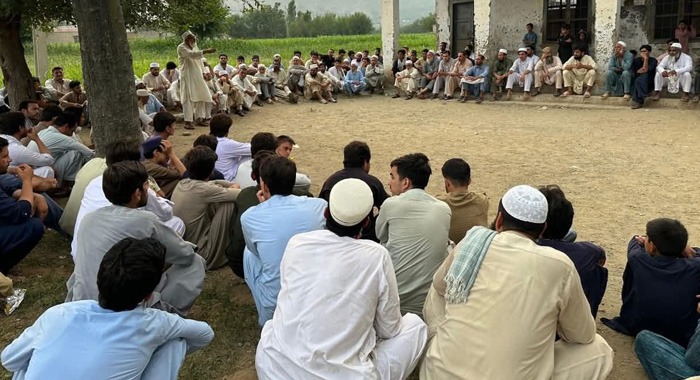As the security forces commence a military operation against the outlawed Fitna al-Khawarij in Bajaur’s Mamund tehsil, the Tali tribes of Salarzai have taken matters into their own hands to protect their villages from infiltration and unrest.
In a significant display of unity and vigilance, a grand jirga was held today at the Tali school, where tribal elders and youth gathered in large numbers to announce strict local security measures aimed at keeping Khawarij, and any possible conflict, out of their area.
According to resolutions passed unanimously at the jirga:
No outsider or unknown person will be given refuge or allowed to enter the village under any circumstances.
No form of military operation will be tolerated inside the village; instead, residents have vowed to keep their areas secure through community-led vigilance.
Any person found outside after dark must carry a visible light source, such as a torch. Suspicious behaviour will result in consequences entirely borne by the individual.
Local patrols and guard posts will be established at strategic points in the village for round-the-clock surveillance.
Armed youth will conduct nightly patrols, and any suspicious movement will trigger immediate action.
All participants of the jirga reportedly took a solemn oath to defend their village and maintain law and order through unity and resolve.
The development comes at a time when over 1,200 militants, affiliated with Fitna al-Khawarij, are reported to be active in Mamund and its adjoining areas. Following the failure of peace negotiations between local tribal elders and the militants, a full-scale security operation is now underway. Residents of 33 affected villages have been directed to temporarily relocate as part of safety protocols, while Section 144 has been imposed across key routes to restrict movement.
The people of Bajaur, many of whom still carry the scars of displacement from the 2008 operation, have expressed both concern and determination. As highlighted by senior journalists, the brunt of military operations is almost always borne by civilians, while militants often escape before action begins. They emphasized the need for cautious strategy, active political leadership, and local engagement to ensure sustainable peace in the region.
With community-led initiatives like that of the Tali tribes, it is clear that the people of Bajaur are no longer willing to remain passive observers. They are ready to take ownership of their security, but it is now up to the state to match their resolve with effective, responsible governance.





